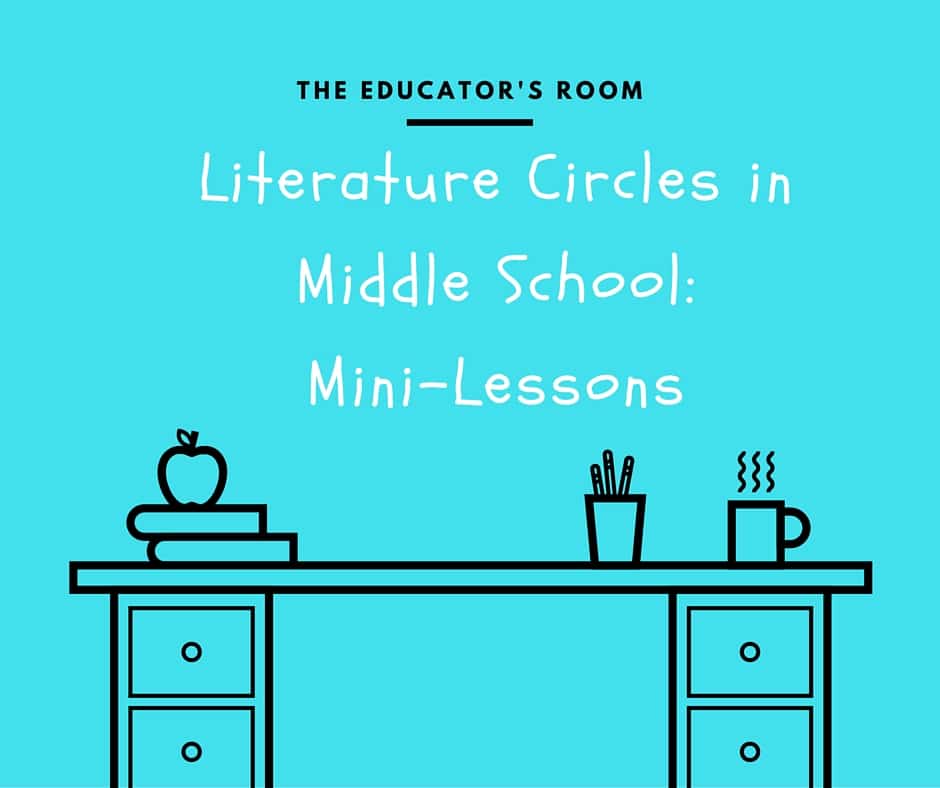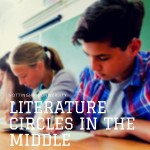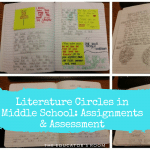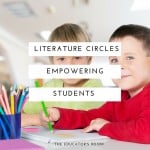Rather than teach a full-class book at the end of the 2015-16 school year, I opted to have my 8th graders read in literature circles. They had the choice between six historical YA lit novels. Each day students met in their literature circles they had certain procedures they were expected to follow. Even though each group was reading a different novel, I was still able to do full-class and small-group mini-lessons.
Full-class Mini-Lessons
Each of the Literature Circles receives a folder with tasks in it specific to the book each group is reading/discussing, however each group gets a variation of the same things:
- A Discussion Guide
- A Theme, Craft, and Connections Packets
- A Wondering Collection Packet
One lesson I do is a review of theme. While my students are reading six different books, theme is something we have talked about all year long and have hashed out together with full-class books. When we read a book together, I put up chart paper with topics written on them. For instance, when we read The Giver, we had topics of “Choice”, “Individuality”, “Family”, and “Honesty”. While we read the book, we put post-it notes of quotes and examples (with page numbers) where we felt the book was saying something about that topic. Later, we used those post-it’s to craft theme statements about the novel.
For the Literature Circles, I give each group a list of topics for their particular book. Their job is to do what we had previously done as a class: keep track of quotes and examples and page numbers where they feel their particular book says something about that topic. Then they need to craft theme statements for their novel.
Another full-class mini-lesson I do is on wondering. Again, this is a technique we have been doing all school year, but I want to ensure that they have the confidence to do it with a group that is not led by me. We review the strategies we have tried out over the school year: using post-it notes, doing double-entry journals, and using a tri-fold or triple column page in their notebooks.
[fusion_builder_container hundred_percent=”yes” overflow=”visible”][fusion_builder_row][fusion_builder_column type=”1_1″ background_position=”left top” background_color=”” border_size=”” border_color=”” border_style=”solid” spacing=”yes” background_image=”” background_repeat=”no-repeat” padding=”” margin_top=”0px” margin_bottom=”0px” class=”” id=”” animation_type=”” animation_speed=”0.3″ animation_direction=”left” hide_on_mobile=”no” center_content=”no” min_height=”none”][bctt tweet=”Full-class mini-lessons were mostly about reviewing things we had done together all year long. ” username=”EducatorsRoom”]
Full-class mini-lessons were mostly about reviewing things we had done together all year long. There wasn’t much new information to them since we were in the final quarter of the school year, and I wanted to see that they could take something teacher-led and do it in a more student-led situation.
Small-group Mini-Lessons
My small-group lessons focus more on the specific book each group is reading and helping them navigate their assignments for it. My meetings with small groups focus on one (or more) of these things:
- gauging comprehension of what they are reading
- teaching a lesson on a certain craft their author uses
- conferencing about their wonderings
- clearing up confusion about assignments misunderstandings of meaning
One of the main mini-lessons I do with each group is focused on craft. In their Theme, Craft, and Connections packet, I list a number of tools the author of their particular novel uses and ask them to find examples. I also leave space for them to find at least one additional tool.
For example, one of the Literature Circles reads A Long Walk To Water. The tools I list for them are: Dual narrative, uncomplicated sentences, sparse use of imagery, simple word choice, and personification. When I sit down with ths group, we first review what each of these looks like. They take notes of examples and we look through a chapter together to get them started. We also discuss what additional tools they may look for. I have an anchor chart on the wall with tools we have discussed like dialogue, similes, metaphors, etc. They review their notes on those so they can watch for them as they read.
Not all groups get the same mini-lessons. Sometimes I have to sit with a group and talk about their organization if they are struggling with keeping everything together. Other times we have to talk about roles and turn taking. Sometimes a group will need a lesson on good listening and discussing. I have even given a crash (review) course on dictionary use and how to figure out words in context when I notice that their wanderings sheet is full of vocabulary words and they are not comprehending the plot.
I think the perception of Literature Circles is that because the class is not involved all in the same novel, the teacher gets a break. It is true that Literature Circles are mostly student-led and student-centered, but I find that I am actually busier during this unit than I am with any of the full-class novels we do.
In a future post, I will unpack the assignments I expect each Literature Circle to complete and discuss how I use the Literature Circles to segue into Inquiry Projects.
Special Note: I rely heavily on the work of Harvey Daniels and Nancy Steineke and their book Mini-lessons for Literature Circles
 [/fusion_builder_column][/fusion_builder_row][/fusion_builder_container]
[/fusion_builder_column][/fusion_builder_row][/fusion_builder_container]







Thanks Katie! These are great ideas, and I especially like the “wondering” section- I love when kids have a chance to open their brains to what they are reading without teacher input!